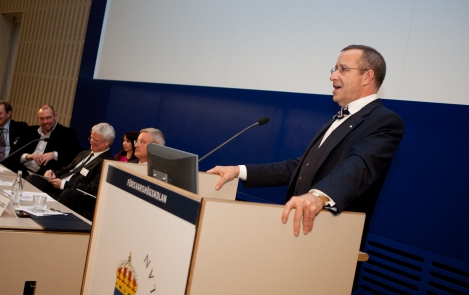-
Reset
+


President Ilves: it’s our shared responsibility to prevent irresponsible people from using the Internet as a weapon
19.01.2011
Contemporary Internet solutions or e-lifestyle will definitely contribute to social involvement and transparency; however, the defence of cyber space and cyber security have become important issues on our political agenda, said the President, Mr. Toomas Hendrik Ilves, at the cyber defence seminar organised at the initiative of Mr. Carl Bildt, the Swedish Minister of Foreign Affairs, at the Swedish Defence College, the Försvarshögskolan.
“Individuals, groups, and states are attempting to make the most of the fact that there are no uniform regulations applicable to cyber space. The Stuxnet virus, which appeared recently, demonstrated, once again, how vulnerable cyber space can be,” said the Estonian Head of State, who is currently on a state visit in Sweden. “I assume that web-based attack weapons will be perfected and become more complicated in the coming years. We are only seeing the tip of the iceberg today.”
According to President Ilves, “we have successfully progressed towards the de-mystification of the “black hole” and have, among other things, developed national cyber security strategies.”
By doing this we have swapped know-how and experiences, said the Estonian Head of State, in describing the open-minded dialogue in the sphere of cyber security that is taking place between Sweden and Estonia as positive. For example, the NATO Centre of Excellence for Co-operative Cyber Defence in Tallinn and the Swedish Defence College organised an international cyber defence exercise, the Baltic Cyber Shield, last May, with some support from various Swedish institutions and the Estonian Cyber Defence Association.
“Cyber space is global; therefore, our response should also be global,” reminded President Ilves, as he assured that Estonia is committed to the promotion of wide-ranging international co-operation in the sphere of cyber-defence between countries with similar ways of thinking, which is as important for the purposes of cyber threats as it is for any other cross-border threats.
The Estonian Head of State expressed his satisfaction with the fact that a number of international organisations, including NATO, the European Union, and the European Council, have recently focused on cyber security. NATO, for example, has begun to develop a detailed cyber defence policy for the alliance and the issue has gained considerable attention in relation to the new strategic concept. The European Union has imposed a common cyber security policy and has conducted the first information infrastructure protection training, which covers the EU as whole.
According to President Ilves, the legal framework of cyber security needs to be studied and he expressed his support for the cyber crime convention of the European Council, saying that he fully supports the implementation of the convention in Estonia, and he invited all of states, who have not yet done so, to sign and ratify the convention.
It is our shared responsibility to prevent irresponsible people from using the Internet as a weapon, the Estonian Head of State emphasised.
“The main question to be answered is the following: how do we establish cyber security guidelines and measures, which will allow us to respond to cyber threats, while protecting the freedom of the Internet. We also need to learn whether a pro-active approach can be used or whether we have to create a new administrative structure for the Internet,” President Ilves told.
Office of the President
Public Relations Department
Phone +372 631 6229



